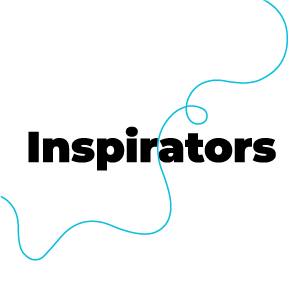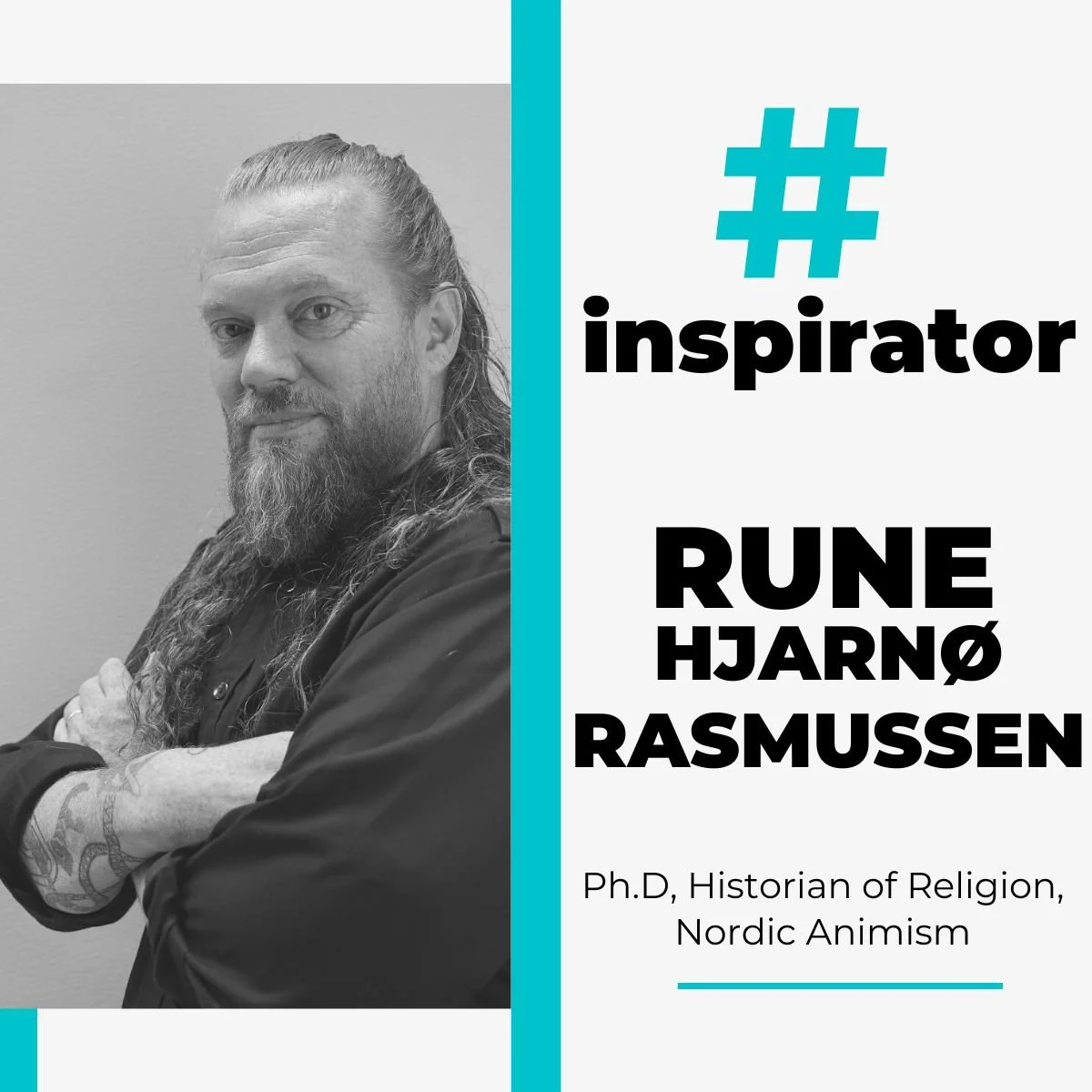Rune Hjarnø Rasmussen
on Nordic Animism
2023 is your regenerative chance. It is the AUN Celebration or The Nordic Year of Cultural Healing.
King Aun sacrificed his sons to Odin to prolong his life. Even back in time when human sacrifice was common, this is the definition of destructive behaviour: “Kings were supposed to be icons of vitality, connectors between human communities and the powers. The story is the best example of the worst imaginable ancestor.” This myth is a general theme in Nordic Animism: violation of kinship resulting in cosmic collapse. Aun mirrors our contemporary society, where disconnection and rupture can be paralyzing.
Rune Hjarnø Rasmussen invites us to “sing and dance and chant and drink and fight against that curse of Aun that makes us participants in social systems that murder our descendants”. How? By invoking the power of traditional Animist knowledge in healing this Aun pattern that characterizes our societies.
Rune is a Historian of Religion, Ph.D. from Uppsala University. His research into Afro-diasporic strategies for maintaining animist reality in the modern world has led him towards reading North European cultural history from the perspective of rejected animist knowledge and practice. The objective is to recover Euro-traditional forms of land connectedness, ecological knowledge and kinship with the greater community of beings.
On his platform, “Nordic Animism”, Rune explains the concept: the world is filled with persons – some of them are humans, some of them are non-human – whom all deserve respect. Respect is the keyword in many indigenous cultures and the essence of animism. It is not simple or primitive, on the contrary – it is an advanced way of knowing and feeling.
The solution? Mythology. Myths are narratives, stories that produce relationships and appeal to our emotions and imagination. A language that reaches deep into our instinctual system, one that makes knowledge workable for us. Especially in the sustainability sector, where climate reports are very technical and require a certain level of knowledge, inserting this narrative could help translate data into a more humane and accessible form for all:
“Many are in the process of realizing that we have related to the world in unsustainable detached ways and that we must turn around now. This might not avert the eco-Ragnarok heading our way, but it will surely open paths for future generations to find less destructive ways of living in the world that comes.”
Thank you, Rune, for being a Nordic Animist!
#INSPIRATORS QUESTIONNAIRE
Name: Rune Hjarnø Rasmussen
Company / Institution: Nordic Animism
Title: Ph.D
Website: www.nordicanimism.com
LinkedIn profile: https://www.linkedin.com/in/rune-hjarn%C3%B8-rasmussen-4626b010/
Country of origin: Denmark
Country you currently live in: Denmark
Your personal definition of Regeneration: I see regeneration as a primary function of dynamic reciprocal exchange that characterizes natural systems. Being regenerative is being in harmony with such patterns of transformation and exchange.
Main business challenge you face: Euro-traditional knowledge is the only kind of traditional knowledge that doesn’t have a voice in current academia. The reason is that the current construction of whiteness basically deems Euro-traditional knowledge as illegitimate. Because it is associated with majority populations it is more difficult to compartmentalize and contain than kinds of traditional “indigenous” knowledge associated with minority groups. As I am presenting this kind of knowledge, I am attempting to change the consolidated structure in the knowledge hierarchies that have defined the West for the last 500 years. Therefore, I face fairly steep barriers in many of the scenes where I am trying to present my work.
Main driver that keeps you going: The realization that I vouch for is that the majority of populations can think of themselves within the same categories that many indigenous groups use for understanding themselves. This realization has an incredible potential for global sustainability and ecology, but it still seems to not be fully acknowledged in cultural spaces.
The trait you are most proud of in yourself: I don’t regard self-pride as a particularly important feature in humans. I suspect that the fetish for it is mostly a result of self-loathing resulting from the thing we really need which is: "Relation to Other!".
This exterior relation-making is where we must derive our sense of self. This is (in my view) the regenerative alternative to introspection which risks feeding modernist essentialisms that have proven counterproductive to the harmonious existence.
The trait you most value in others: Kindness, humility, humour and wisdom.
Passions & little things that bring you joy: I like listening to ebooks.
A hint or starting point for companies or professionals that are taking the first steps in the regeneration journey: It is fully possible to create initiatives based on alternatives to extractive and exploitative systems. In the corporate world, the first thing you need to do is to ensure patterns of ownership that counteract oligarchy. I recommend the principles outlined in Pelle Dragsted’s book Nordic Socialism.
Most used and abused clichés about sustainability that bother you:
I am suspicious about the common use of anthropocentrism as a negative. I mean… I get the gist. It's just... I am not sure that it is a good metaphor to bring us towards a culture of custodianship and land connectedness.
I am also critical of how identitarian ways of seeing the world have hacked into the progressive cultural, political and activist spaces. The current obsession with identity feels as (with a twist on Žižek) it is easier for people to imagine the end of the world than to imagine the end of nationalism.
An honest piece of advice for young people who lose hope: We can’t afford to lose hope – and remember: life is not threatened, neither is humanity, only our present level of comfort.
Books that had a major impact on you:
Sand Talk, Tyson Yunkaporta
Animism, Respecting the living world, Graham Harvey
Dawn of Everything, David Graeber and Wengrow
The Elder Edda, my ancestors
How to blow up a pipeline, Andreas Malm
Falling Sky, Davi Kopenawa
Økokrati, Jens André Herbener
Braiding Sweetgrass, Robin Wall-Kimmerer
Movies / Documentaries you would watch all over again:
I like TV series such as Black Earth Rising, Get Down, Damnation.
On a more regenerative node, I really recommend Songs of Earth by Margreth Olin.
Music that makes you (and your heart) sing: I like a lot of different kinds of music: Bob Marley, Mozart, Run DMC, Wardruna.
Places you travelled to that left a mark on you: Brazil, Ghana, Sudan, Angola, Sápmi, Sweden.
Global Regenerative Voices you recommend us to follow:
Tyson Yunkaporta ("The other others" podcast)
Mimirsbrunnr.info
Mathias Nordvig ("The Sacred Flame" podcast)
Rune Engelbreth Larsen
Jimmy Ó Briain Billings ("Tuiscint na Talún" podcast)
Bayo Akomolafe
Robin Wall Kimmerer
Winona LaDuke
And let me just be cheeky and recommend my own platform, Nordic Animism!
Trends in Regeneration we should keep an eye on:
I think Euro-traditional knowledge is about to have a major breakthrough.
The breakthrough might not come through my own work (though I am definitely trying to voice as much and as loudly as I can), but it will surely come. We live in an age where power asymmetries are being criticized in all walks of life. In the question above regarding the “business challenges” I face, I mentioned those barriers towards decolonizing the knowledge system of white people. These barriers are next in line for the decolonial critique of power and when they break a whole new self-image for the Western world will start taking up space in wider public and cultural spaces. This new self-image is already taking shape, but it is still only spoken by relatively marginal individual voices.
Best places for business networking (online or offline): I am using Facebook and LinkedIn.
Events we should attend: Conferences on indigenous knowledge, events of eco-activism.
Associations, business clubs, tribes you belong to – and why: I am not really part of any clubs and associations, but I am inscribed in a rather far-reaching network of voices online that are dialoguing about issues such as traditional knowledge, sustainable culture, custodianship, kinship with the more-than-human community and land-connectedness.
Sustainable Development or Regeneration courses, trainings, or certifications that really teach us how to have an impact:
I recommend courses by such figures as Mathias Nordvig, Jimmy Ó Briain Billings, myself, Danica Boyce, and the American operation “White Awake”. There are possibly more, but these are the ones that spring to mind.
Reasons to feel optimistic about our future in 2030:
Many are realizing that we have related to the world in unsustainable detached ways and that we must turn around now. This might not avert the eco-Ragnarok that is heading our way, but it will surely open paths for future generations to find less destructive ways of living in the world that comes.
Reasons to feel pessimistic about our future in 2030:
Climate change, biodiversity collapse, microplastic in oceans, global tipping points, insect apocalypse, topsoil erosion, agriculture collapsing with ensuring starvation, methane release, wildfires, intensifying hurricanes, global inequality, the military-industrial complex, nuclear war, the prison industrial complex, - social media impact on us, like mirror cabinets, rising fascism, quintupled numbers of psychiatric diagnoses, exploding stress levels, a steep decline in literacy, political polarization running amok, insane levels of surveillance.
Regenerative Leadership qualities much needed today:
Pretty much the same qualities that I value in others: kindness, humility, humour and wisdom. For leaders, I would add a capacity to create, grow, and uphold connectivity. I would also add an emphasis on “wisdom”. And I mean real wisdom - such as knowing your own shortcomings, not only being kind and respectful but creating spaces that grow these qualities in the people that inhabit them.
Quote that inspires you:
"Reasons are best worked out in relationship – especially if you are looking for reasons to eat someone – or if you are looking for reasons not to be eaten."
(Graham Harvey – An Animist Manifestor)
Your own quote that will inspire us:
᛬ᛅᛚᛏ᛫ᛘᛅᚴᛁᚾ᛫ᛏᛁᛚ᛫ᛅᛚᛦᛅ᛫ᚠᛁᛚᛅᚴᛅ᛬



